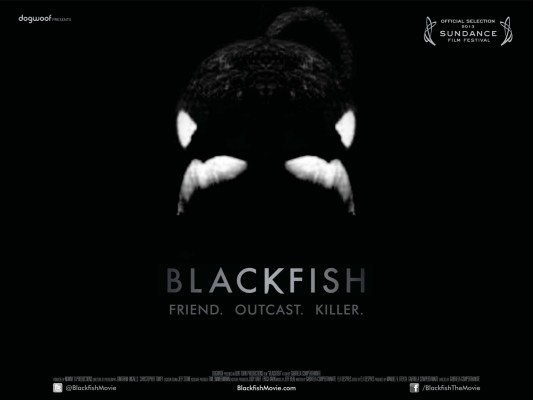CNN documentary unveils the disturbing truth behind orca whales in captivity
On Thursday, November 28, Rose McCoy, 12, of Tribeca courageously jumped the barricades at the world-famous Macy’s Thanksgiving Day Parade . While some may think McCoy wanted a better view of the vibrant scenery, she actually wanted to make a statement against one of the participating floats; specifically the float sponsored by SeaWorld. Holding a sign that read “Boycott SeaWorld”, McCoy joined the movement against orca whales in captivity.
The CNN documentary, Blackfish, tells the chilling story of Tilikum, an orca whale that has been in captivity for the past thirty years. The film covers Tilikum’s capture at about two years of age, life in captivity, and the deaths he has caused. The film’s director, Gabriela Cowperthwaite, did not believe the claims SeaWorld made following the tragic death of veteran trainer Dawn Brancheau. Cowperthwaite immediately began researching the incident because she believed, “there had to be more to this story.”
Cowperthwaite analyzes the causes surrounding Tilikum’s aggression through interviews with marine biologists, animal-behavior specialists, and former SeaWorld trainers. Not only does the film reveal the past incidents with Tilikum but it also reveals the great lengths SeaWorld has taken in order to conceal the true nature of these events. Former trainer, John Hargrove, commended Cowperthwaite on her bravery.
“When she started to find out these things that had been covered up and SeaWorld had not been entirely truthful about [Brancheau’s death]…she just felt like, ‘I have this information and I have a responsibility now to put this film out.”
Some of the information Cowperthwaite discovered was jarring. The film features undercover footage at SeaWorld, where representatives are misinforming guests regarding the life expectancy and the collapsed dorsal fins of the orca whales. When SeaWorld representatives are asked about the lifespan of orca whales, they tell guests that the orca lives to about thirty years in the wild and will live longer in captivity. The orca whale’s average life expectancy is thirty to fifty years. However, for whales in captivity the median age of an orca is merely nine years. Furthermore, the maximum lifespan of an orca in the wild is eighty to ninety years.
The reasoning behind the collapsed dorsal fin is also manipulated. SeaWorld representatives explain that twenty-five percent of all orcas have a collapsed dorsal fin. However, less than one percent of orcas in the wild have it; the reason for the collapse is atrophy. Orca whales can swim up to 100 miles per day in the wild. However due to close quarters, orca whales in captivity would have to swim the circumference of their tank 1,900 times in order to equate that distance.
Following the film’s premiere SeaWorld released a response to the film.
“Blackfish is billed as a documentary, but instead of a fair and balanced treatment of a complex subject, the film is inaccurate and misleading and, regrettably, exploits a tragedy that remains a source of deep pain for Dawn Brancheau’s family, friends, and colleagues. To promote its bias that killer whales should not be maintained in a zoological setting, the film paints a distorted picture that withholds from viewers key facts about SeaWorld — among them, that SeaWorld is one of the world’s most respected zoological institutions, that SeaWorld rescues, rehabilitates and returns to the wild hundreds of wild animals every year, and that SeaWorld commits millions of dollars annually to conservation and scientific research. Perhaps most important, the film fails to mention SeaWorld’s commitment to the safety of its team members and guests and to the care and welfare of its animals, as demonstrated by the company’s continual refinement and improvement to its killer whale facilities, equipment and procedures both before and after the death of Dawn Brancheau.”
As stewards of the Earth it is our responsibility to advocate for the orcas living in captivity. The conditions and treatment they receive is inhumane and unnatural. If you would like to join the cause there are many things you can do. You can sign petitions, write letters to Blackstone Group (SeaWorld’s owners), and refuse to buy an admission ticket at SeaWorld. Through spreading awareness and demanding action from those victimizing these poor mammals, using orca whales for entertainment will one day be an act of the past.








